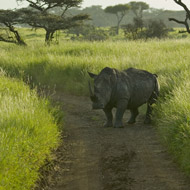
Ivory would be sold to traditional medicine markets in Asia
The developing country of Swaziland in Africa plans to legalise trade in rhino horn in order to pay for anti-poaching measures.
According to The Guardian, Swaziland’s anti-poaching body wants to sell the country’s stockpile of horn collected from naturally deceased animals and confiscated from poachers.
Leaked documents show that the Cites Management Authority of Swaziland plans to sell the horn to traditional medicine markets in Asia.
The money raised - an expected $9.9m - would then be used to protect the country’s remaining white rhinos from poaching. The country also plans to sell horn harvested from living rhino, as it grows back after being cut.
Swaziland’s proposal will be formally discussed and voted on at the CITES conference of Parties in Johannesburg in September.
Experts say the bid is likely to fail because most parties feel legalisation would provide a mechanism for laundering illegal horn and undermine law enforcement.
Indeed, just last week the Government of South Africa decided not to proceed with plans to legalise trade in rhino horn over concerns that it would increase demand.
Illegal poaching is a major issue for Africa. Each year over 30,000 elephants are killed for their ivory, but ongoing debates about whether to legalise the trade split opinion.
On Friday, Kenya set fire to their elephant and rhino ivory stockpile to show the country’s commitment to saving Africa’s elephants. But conservationists argue that destroying too much of a rare commodity could increase its value and encourage more poaching.
Namibia has a very different approach to tackling the poaching problem. As so few tourists visit the country, trophy hunting is one of the main sources of income - so poachers have now effectively become gamekeepers.
Hunters pay tens of thousands to kill buffalo, elephants and rhino in communal conservancies, with the money going towards park rangers and electricity for villagers. Only a certain amount of animals can be shot each year, with the meat going to the local community.
According to locals, the method works because there is no corruption and, without it, local people would suffer.



 The BSAVA has opened submissions for the BSAVA Clinical Research Abstracts 2026.
The BSAVA has opened submissions for the BSAVA Clinical Research Abstracts 2026.